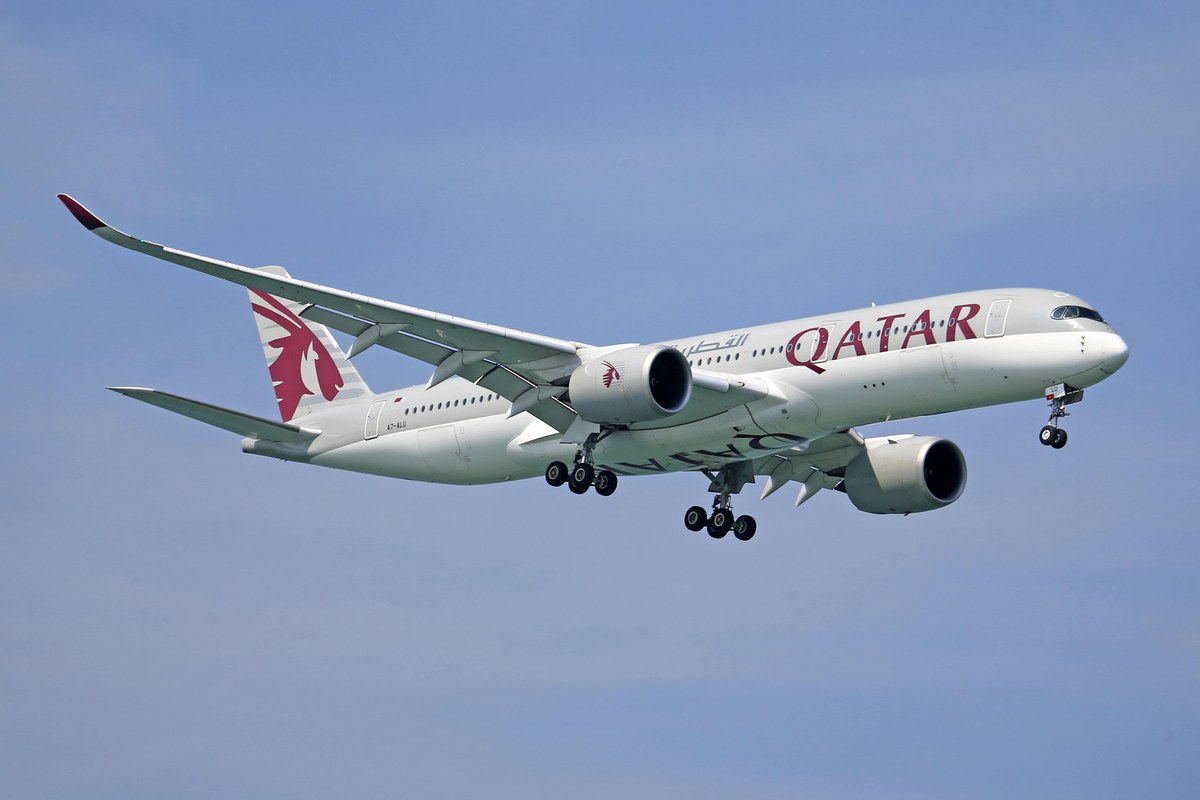In the dynamic world of international travel, few events cause as much immediate disruption and concern as unexpected flight cancellations. When these cancellations involve major carriers like Qatar Airways and routes to sensitive regions such as Iran, the ripple effects are felt far and wide. The news that a Qatar Airways flight to Iran was cancelled recently has not only impacted countless travelers but also cast a spotlight on the intricate geopolitical landscape of the Middle East, highlighting the delicate balance between air travel logistics and regional stability.
This article delves into the complexities surrounding such events, exploring the reasons behind these cancellations, their impact on passengers and the broader aviation industry, and the underlying geopolitical factors that often dictate the flow of air traffic in this vital part of the world. Understanding these dynamics is crucial for anyone planning international travel, especially to regions where political currents can swiftly alter travel advisories and airline operations. We aim to provide a comprehensive overview, drawing on available information to shed light on a situation that often leaves travelers in limbo.
Table of Contents
- The Geopolitical Landscape & Flight Disruptions
- Understanding the "Why": Geopolitical Tensions
- Impact on Travelers and Aviation
- Qatar Airways' Stance and Passenger Communication
- The Broader Context: Travel Advisories and Safety
- Economic Implications and Regional Stability
- Looking Ahead: Future of Air Travel in the Gulf
The Geopolitical Landscape & Flight Disruptions
The Middle East, a region of immense strategic importance, is frequently subject to geopolitical shifts that can directly influence various sectors, including international aviation. The recent news of a **Qatar Airways flight to Iran cancelled** serves as a stark reminder of this reality. Qatar, an independent emirate on the west coast of the Persian Gulf, holds a unique position. It is a small peninsular nation, lying on the northeastern coast of the Arabian Peninsula, sharing a sole land border with Saudi Arabia to the south and surrounded by the waters of the Gulf. This geographical reality, coupled with its vast natural resources, places Qatar at the heart of regional dynamics. The decision to cancel a flight, especially one connecting two nations within the same volatile region, is rarely made lightly. It often stems from a complex assessment of security risks, airspace safety, and diplomatic considerations. For an airline like Qatar Airways, renowned globally for its service and extensive network, such a move reflects a high level of caution. While passengers typically enjoy special fares, collect Avios, and more when flying with Qatar Airways, these perks become secondary when safety concerns necessitate a sudden change in schedule. The ongoing tensions and unpredictable events in the broader Middle East can swiftly transform travel plans, turning routine journeys into moments of uncertainty.Qatar's Strategic Position in the Gulf
To fully grasp the context of a **Qatar Airways flight to Iran cancelled**, one must appreciate Qatar's strategic importance. It has one of the world’s largest reserves of petroleum and natural gas and employs large numbers of foreign workers, making it a global energy powerhouse and a melting pot of cultures. This economic might grants Qatar significant influence, often positioning it as a mediator in regional disputes. Discover key facts that define Qatar, from its unique geographical location, vibrant capital city, rich history, and diverse community. Explore the core features that set the stage for Qatar’s role on the international stage. Despite its small size, Qatar plays a disproportionately large role in regional diplomacy and international relations. Its capital, Doha, frequently hosts critical talks and serves as a hub for various international organizations. This dual role as an economic giant and a diplomatic bridge builder means that any disruption in its operations, such as the grounding of flights to a neighboring country, sends a clear signal about the prevailing security climate. The nation's stability is intricately linked to the broader stability of the Gulf region, making it highly sensitive to any signs of escalating tensions.Understanding the "Why": Geopolitical Tensions
The immediate cause for a **Qatar Airways flight to Iran cancelled** is almost always rooted in security concerns. In public, Qatar was insisting on the right to defend itself after Iran attacked a U.S. military site in the emirate, a clear indication of the direct impact regional conflicts can have on Qatar's own security. Such incidents immediately raise the threat level for all air traffic operating in or near affected zones. Airlines, bound by international aviation safety regulations and their own duty of care to passengers and crew, must react swiftly to mitigate risks. This often involves rerouting flights, adjusting schedules, or, in severe cases, outright cancellations. The broader context involves the intricate web of relationships and rivalries that define the Middle East. Unease gripped the Gulf Arab states that morning, a sentiment that can quickly translate into operational changes for airlines. These tensions are not static; they ebb and flow, influenced by political rhetoric, military actions, and diplomatic breakthroughs or breakdowns. For an airline like Qatar Airways, which prides itself on its global connectivity, these regional dynamics present a constant challenge, requiring continuous monitoring and agile responses to ensure passenger safety above all else.The Role of Diplomacy and Mediation
Interestingly, while public statements often focus on defense and security, behind the scenes, Qatar was already mediating a truce between Israel and other parties. This highlights Qatar's dual approach: asserting its right to self-defense while simultaneously engaging in quiet diplomacy to de-escalate conflicts. This mediating role is a defining characteristic of Qatar's foreign policy and is crucial in understanding its responses to regional instability, including decisions regarding air travel. The cancellation of a **Qatar Airways flight to Iran cancelled** might, therefore, be seen not just as a reaction to immediate threats but also as a cautious move within a larger diplomatic strategy. By limiting travel, Qatar Airways aligns with broader efforts to minimize risk during periods of heightened tension, indirectly supporting diplomatic endeavors to restore calm. Qatar in-depth country profiles often emphasize its unique, hard-to-find content on its customs, culture, history, geography, economy, current events, photos, video, and more, all of which contribute to its complex and often influential role in global affairs. This nuanced position means that even seemingly logistical decisions like flight cancellations can carry significant diplomatic weight.Impact on Travelers and Aviation
The direct impact of a **Qatar Airways flight to Iran cancelled** is, naturally, felt most acutely by the passengers. Travelers suddenly find their plans disrupted, often facing significant inconvenience, financial losses, and emotional stress. Business travelers miss crucial meetings, families are separated, and tourists lose out on cherished experiences. The immediate aftermath involves a scramble for information, alternative travel arrangements, and understanding refund policies. Airlines typically provide options like rebooking on later flights, rerouting through different destinations, or offering refunds, but these solutions don't always fully compensate for the disruption. Beyond individual travelers, such cancellations have broader implications for the aviation industry. They lead to financial losses for airlines due to lost revenue and operational costs associated with rebooking and re-routing. They can also affect an airline's reputation, even if the cancellation is due to unavoidable external factors. Furthermore, frequent disruptions can deter future travel to affected regions, impacting tourism and economic ties. The intricate network of global aviation relies on predictability, and geopolitical volatility undermines this fundamental requirement.Navigating Cancellations and Rebooking
When a **Qatar Airways flight to Iran cancelled** notice arrives, passengers are advised to immediately contact the airline or their travel agent. Qatar Airways, like other major carriers, has established protocols for such situations. Passengers are typically informed via SMS, email, or through updates on the airline's official website and mobile app. It is crucial for travelers to keep their contact information updated with the airline. Options usually include:- Rebooking: Passengers can often rebook their flight for a later date without additional charges, subject to seat availability.
- Rerouting: In some cases, the airline might offer to reroute passengers through alternative cities or on partner airlines, though this might involve longer travel times.
- Refunds: For significant cancellations, passengers are generally entitled to a full refund for the unused portion of their ticket.
- Accommodation: Depending on the reason for cancellation and local regulations, airlines may provide accommodation and meal vouchers for stranded passengers.
Qatar Airways' Stance and Passenger Communication
Qatar Airways, a leading global carrier, is generally committed to passenger safety and transparent communication. When a **Qatar Airways flight to Iran cancelled** decision is made, it is done so with paramount consideration for the well-being of its passengers and crew. The airline's public statements typically emphasize safety as the primary driver behind such operational changes. While the specific details of security assessments are rarely disclosed for obvious reasons, the airline usually assures the public that decisions are made in consultation with relevant authorities and international aviation bodies. The challenge for any airline during such times is to balance the need for swift action with effective communication. Passengers require timely and accurate information to make alternative arrangements. Qatar Airways usually leverages its digital platforms – its website, social media channels, and mobile app – to disseminate updates. They also activate their customer service centers to handle the surge in inquiries. The goal is to minimize confusion and provide clear guidance, even when the underlying circumstances are complex and rapidly evolving. The airline's reputation for service, where customers usually find the perfect dose of travel inspiration to experience Qatar, uncovering a world of rich culture, stunning sights, and more, depends heavily on how it manages these challenging situations.The Broader Context: Travel Advisories and Safety
A single **Qatar Airways flight to Iran cancelled** is often a symptom of broader travel advisories and heightened security concerns across a region. Governments worldwide issue travel advisories to their citizens, recommending caution or even advising against travel to certain areas based on perceived risks. These advisories are dynamic and can change rapidly in response to geopolitical events, natural disasters, or health crises. For instance, out of an abundance of caution, we recommend American citizens shelter in place until further notice, the U.S. Embassy in Doha, Qatar, said Monday amid concerns about regional instability. Such warnings are critical indicators for both travelers and airlines. When an embassy issues such a strong recommendation, it signals a significant level of concern about the safety and security environment. Airlines closely monitor these advisories, as they directly impact their ability to operate safely and responsibly. Operating flights into areas with high-level travel warnings can expose airlines to significant risks, both in terms of physical safety and legal liability. Therefore, a cancellation is often a direct response to such official warnings, aligning the airline's operational decisions with government recommendations for citizen safety.U.S. Embassy Warnings and Regional Unease
The U.S. Embassy in Doha's warning for American citizens to "shelter in place" underscored the gravity of the situation that led to the **Qatar Airways flight to Iran cancelled**. This kind of advisory is not issued lightly; it reflects intelligence assessments of credible threats or a significant deterioration of the security environment. Unease gripped the Gulf Arab states that morning, a palpable tension that permeated diplomatic circles and public consciousness alike. This collective anxiety directly influences decisions made by airlines and governments regarding travel to and from the region. These warnings are designed to protect citizens, but they also serve as a barometer of regional stability. When a major power's embassy issues such a directive in a key regional hub like Doha, it reverberates across the entire Gulf. It prompts other nations and international organizations to reassess their own security postures and travel advice. For travelers, it's a clear signal to exercise extreme caution and reconsider non-essential travel. For airlines, it necessitates a review of flight paths, ground operations, and contingency plans, often leading to cancellations or significant schedule adjustments.Economic Implications and Regional Stability
The cancellation of a **Qatar Airways flight to Iran cancelled** has economic ramifications that extend beyond the immediate impact on passengers and the airline's bottom line. Qatar, as noted, has one of the world’s largest reserves of petroleum and natural gas and employs large numbers of foreign workers, making its economic stability intrinsically linked to regional peace. Disruptions to air travel, especially between neighboring countries, can impede trade, investment, and the movement of skilled labor. Iran, too, is a significant regional player with its own economic interests tied to international connectivity. While sanctions and political isolation have impacted its economy, air travel remains a crucial link for business, cultural exchange, and humanitarian aid. When major airlines like Qatar Airways suspend services, it can further isolate the country and hinder economic activity. The broader regional stability is a critical factor for sustained economic growth and development in the Gulf. Any escalation of tensions that leads to flight cancellations or airspace restrictions poses a threat to the economic interests of all nations involved, underscoring the interconnectedness of security and prosperity in the region.Looking Ahead: Future of Air Travel in the Gulf
The incident of a **Qatar Airways flight to Iran cancelled** serves as a potent reminder of the volatile nature of air travel in geopolitically sensitive regions. While airlines strive for seamless operations and passengers seek reliable travel, the realities of international relations can often supersede commercial interests. The future of air travel in the Gulf will largely depend on the trajectory of regional stability and the diplomatic efforts to de-escalate tensions. Airlines like Qatar Airways will continue to adapt, employing sophisticated risk assessment models and maintaining flexible operational plans. Passengers, on their part, will need to remain vigilant, closely monitoring travel advisories and airline communications. Exploring our interactive map of Qatar, guiding you around the nation's key attractions, might inspire future trips, but travelers must always be prepared for the possibility of disruption in a region as dynamic as the Middle East. The ability of countries like Qatar to continue their mediating roles will be crucial in fostering an environment where air travel can flourish without constant fear of disruption. Ultimately, the hope is for a future where geopolitical stability allows for uninterrupted connectivity, enabling people to enjoy special fares, collect Avios, and experience the rich cultures of the region without concern for their safety.In conclusion, the cancellation of a Qatar Airways flight to Iran is more than just a logistical hiccup; it's a significant event reflecting the complex interplay of safety, geopolitics, and global aviation. While inconvenient for travelers, such decisions prioritize human lives, underscoring the airline's commitment to safety in an unpredictable world. As the region navigates its challenges, passengers are advised to stay informed and flexible. Have you ever experienced a flight cancellation due to geopolitical events? Share your thoughts and experiences in the comments below, or explore other articles on our site for more insights into global travel and aviation.
Related Resources:



Detail Author:
- Name : Otilia Gleason
- Username : ryan.darron
- Email : hdibbert@crona.com
- Birthdate : 1981-07-31
- Address : 7163 Johns Path Port Dominique, WA 41889
- Phone : +1 (860) 752-8775
- Company : Bartoletti, Cronin and Stroman
- Job : Adjustment Clerk
- Bio : Voluptatum commodi quidem mollitia consequatur. At ipsam culpa facere exercitationem. Id dolore molestiae voluptas non et assumenda. Numquam quo in veritatis ex tempore rerum.
Socials
linkedin:
- url : https://linkedin.com/in/fritschs
- username : fritschs
- bio : Tenetur et in illum maiores.
- followers : 6850
- following : 2217
twitter:
- url : https://twitter.com/stanley5522
- username : stanley5522
- bio : Officiis qui ullam in distinctio. Ipsum voluptatem est non et officia vel ratione.
- followers : 6482
- following : 2739
instagram:
- url : https://instagram.com/fritsch1990
- username : fritsch1990
- bio : Ut reiciendis sit consequatur voluptates aut. Adipisci qui sed reiciendis eos.
- followers : 2677
- following : 963